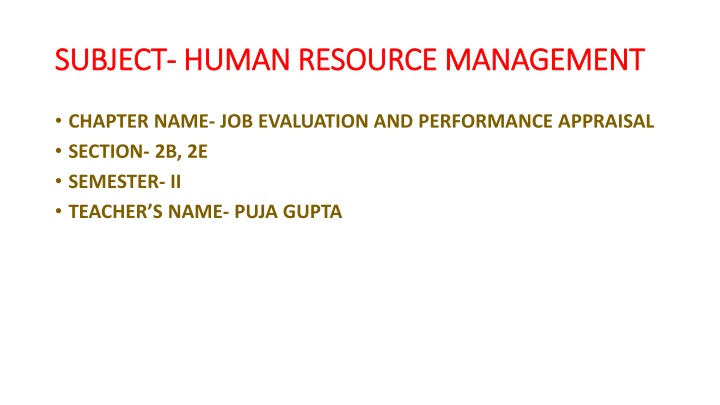Importance and Methods of Job Evaluation in Human Resource Management
Job evaluation is essential in determining the value of a job within an organization, aiding in fair pay structures, employee selection, bonus calculations, and conflict resolution. However, it has disadvantages like inaccuracies, time consumption, and complexity. Steps involved include job analysis, method selection, factor identification, job ranking, and pay structure revision. Different methods such as analytical (point rating, factor comparison) and non-analytical (ranking, grading) are used to evaluate jobs effectively.
Download Presentation

Please find below an Image/Link to download the presentation.
The content on the website is provided AS IS for your information and personal use only. It may not be sold, licensed, or shared on other websites without obtaining consent from the author.If you encounter any issues during the download, it is possible that the publisher has removed the file from their server.
You are allowed to download the files provided on this website for personal or commercial use, subject to the condition that they are used lawfully. All files are the property of their respective owners.
The content on the website is provided AS IS for your information and personal use only. It may not be sold, licensed, or shared on other websites without obtaining consent from the author.
E N D
Presentation Transcript
SUBJECT SUBJECT- - HUMAN RESOURCE MANAGEMENT HUMAN RESOURCE MANAGEMENT CHAPTER NAME- JOB EVALUATION AND PERFORMANCE APPRAISAL SECTION- 2B, 2E SEMESTER- II TEACHER S NAME- PUJA GUPTA
JOB EVALUATION JOB EVALUATION MEANING:- determining the worth of a job in relation to other jobs. SIGNIFICANCE/IMPORTANCE/ADVANTAGES OF JOB EVALUATION:- Helps to build a sound pay structure Enables in proper selection of employees Provides a basis for bonus and incentive calculation Settlement of disputes regarding wages Helps in resolving conflicts Elimination of biasness and nepotism Helps to assess job requirements Enables in proper assessment of new jobs. job evaluation is a systematic and orderly process of
DISADVANTAGES OF JOB EVALUATION: DISADVANTAGES OF JOB EVALUATION:- - Inaccuracy of job analysis Selection of improper method of job evaluation Time consuming and expensive Impractical assumptions Requires technical personnel for calculation and formulation Complex nature
STEPS OF JOB EVALUATION: STEPS OF JOB EVALUATION:- - Job analysis Selection of a method Selection of proper factors Ranking of jobs Pricing in order of ranks assigned Periodical review and revision of pay structure.
METHODS OF JOB EVALUATION METHODS OF JOB EVALUATION ANALYTICAL OR QUANTITATIVE METHOD:- POINT RATING METHOD:- It enables its evaluators to give a point score to each job. There is no uniform point system available for all organizations. A job manual is usually used in this system. The selected jobs are then analysed and some common factors such as skill ,physical effort, mental effort, etc. are identified. FACTOR COMPARISON METHOD:- In this method all jobs are compared and ranked on each of a number of factors which are common, more or less to all jobs. Normally the factors include mental requirement, skill, physical exertion responsibility and working condition.
METHOD OF JOB EVALUATION ( CONTINUED) METHOD OF JOB EVALUATION ( CONTINUED) NON ANALYTICAL OR QUALITATIVE METHOD:- RANKING METHOD:- jobs are examined as a whole, rather than on the basis of factors. Each job is compared with others in terms of responsibilities , duties etc. and its position is fixed .The evaluator gives them ranks on the basis of his understanding. GRADING OR JOB CLASSIFICATION METHOD:- The job categories are first described and decided upon by a committee, after which, the standards are set. Job grades are organized in the order of their importance in the form of schedule.
JOB ANALYSIS JOB ANALYSIS MEANING:- Job analysis is a systematic procedure for securing and reporting information defining a particular job. IMPORTANCE:- Basis for job evaluation Enables creation of fair and justified pay structure Helps in manpower planning Helps in selection and recruitment Aids in training and development of employees Assists in job designing Formal process.
JOB DESCRIPTION JOB DESCRIPTION MEANING:- It is a written statement of a particular job in the business organization. It include Job title, code number along with the department The job summary The content of the job The working condition Supervisory responsibility Relationships.
JOB SPECIFICATION JOB SPECIFICATION MEANING:-it is a written narrative of the minimum required qualifications for employees to perform a specific job. It is prepared on the grounds of minimum level of qualifications relating to education, skill, experience, competencies and knowledge and aptitude requirement for an employees performance of a job satisfactorily in the work place.
PERFORMANCE APPRAISAL PERFORMANCE APPRAISAL MEANING:- performance appraisal evaluates systematically performance of individual with regard to his or her performance on the job and his potential for development. ADVANTAGES OR SIGNIFICANCE:- Basis for training and development Assessment of job performance Fixation of pay package Facilitates job evaluation Gives feedback and amends area of improvement of employees Career planning and growth Motivation for employees Helps to arrive at significant decisions.
PERFORMANCE APPRAISAL PERFORMANCE APPRAISAL DISADVANTAGES:- Supervisor s biasness may effect in rating Generalisation error Error due to sampling tendency Creates negative impact Time consuming Costly.























